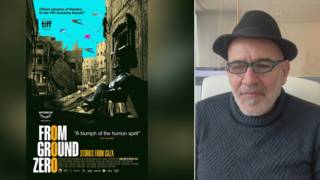
Related
Guests
- Douglas Colbertprofessor of law at the University of Maryland School of Law and the director of the Access to Justice pretrial clinic. He is the founder of the Lawyers at Bail Project, which represents more than 4,000 indigent defendants at bail hearings. In 2013, Colbert helped win a seven-year class action suit that guaranteed indigent defendants their constitutional right to counsel when first appearing before a judicial officer.
As the Justice Department launches a probe of the Baltimore Police Department for a potential pattern of unconstitutional policing in the wake of the death of Freddie Gray, attorneys for the six officers indicted over Gray’s death are challenging the role of Baltimore’s top prosecutor, Marilyn Mosby. On Friday, defense lawyers filed a motion demanding Mosby recuse herself because of alleged conflicts of interest and “egregious” violations. The attorneys say Mosby’s judgment is compromised by her close relationship with the Gray family’s attorney and her husband’s job as a city councilmember from the district where Gray was arrested. The motion goes on to accuse Mosby of quelling the Baltimore riots by offering cops “up to the masses” as scapegoats. Mosby has rejected the claims and vowed to remain on the case. “There are consistent attempts here to derail the prosecution, to undermine public confidence and at the same time to influence the people who will one day be sitting as jurors,” says our guest, Douglas Colbert, professor at the University of Maryland School of Law. He also responds to reports that Baltimore police officers are now reportedly hesitant to do their jobs.
Transcript
AMY GOODMAN: We turn now to Baltimore, where the Justice Department has launched a probe of the city’s police department for a potential pattern of unconstitutional policing in the wake of the death of Freddie Gray. Attorney General Loretta Lynch announced the investigation.
ATTORNEY GENERAL LORETTA LYNCH: Today, the Department of Justice is opening an investigation into whether the Baltimore Police Department has engaged in a pattern or practice of violations of the Constitution or federal law. This investigation will begin immediately and will focus on allegations that Baltimore Police Department officers use excessive force, including deadly force; conduct unlawful searches, seizures and arrests; and engage in discriminatory policing.
AMY GOODMAN: The Justice Department probe comes as attorneys for the six officers indicted over Freddie Gray’s death are challenging the role of Baltimore’s top prosecutor, Marilyn Mosby. Almost immediately after the charges were announced earlier this month, the attorney for Baltimore’s police union, Michael Davey, reacted by questioning the fairness of their prosecution.
MICHAEL DAVEY: No officer injured Mr. Gray, caused harm to Mr. Gray, and they are truly saddened by his death. These officers did nothing wrong. We believe that the actions taken today by the state’s attorney are an egregious rush to judgment, and we have grave concerns about the fairness, integrity of the prosecution of our officers.
AMY GOODMAN: Well, on Friday, the attorneys for the six Baltimore officers who were charged for the death of Freddie Gray filed a motion demanding that Marilyn Mosby, the chief prosecutor in the high-profile case, recuse herself because of alleged conflicts of interest. The wide-ranging attack on Mosby’s credibility spans more than a hundred pages and accuses her of egregiously violating prosecutorial ethics. According to the defense’s motion, Mosby’s judgment is compromised by her close relationship with the Gray family’s attorney and her husband’s job as city councilmember from the district where Gray was arrested. The motion goes on to accuse Mosby of quelling the Baltimore riots by offering cops up to the masses as scapegoats. It calls for the case to be dismissed, and if not, for a special prosecutor to be appointed. Speaking on MSNBC, Mosby rejected such calls and denied any conflict of interest.
MARILYN MOSBY: When you have a special prosecutor, where’s the accountability? Someone politically is going to appoint someone else, and who do you hold accountable? The constituents of Baltimore City elected me to exercise my discretion and to apply justice fairly and equally with or without a badge. With reference to a conflict of interest, there is no conflict of interest. My husband represents the district in which I live. I am the Baltimore City state’s attorney. I represent his district and 13 other districts throughout the city. I prosecute crimes there. I don’t have to turn on the news and open up the newspaper in order to see the crime impacting my community. All I have to do is open up the door. So there is no conflict.
AMY GOODMAN: That was Baltimore’s State’s Attorney Marilyn Mosby speaking on MSNBC. And when she announced the charges several Fridays ago, she was asked in the news conference afterwards if she had a conflict of interest because her husband is a Baltimore city councilmember. This was her response.
MARILYN MOSBY: I don’t see an appearance of conflict of interest. My husband is a public servant. He works on the legislative side. I am a prosecutor. I am also a public servant. I uphold the law. He makes the laws. And I will prosecute any case within my jurisdiction.
AMY GOODMAN: Marilyn Mosby is the youngest state’s attorney of any major city in the United States. All of this comes as each of the six officers charged in Freddie Gray’s death are demanding over $75,000 in damages for their, quote, “loss of freedom and dignity,” as well as physical and psychological harm.
Well, for more, we go directly to Baltimore, where we’re joined by Doug Colbert. He is a professor of law at the University of Maryland School of Law and the director of the Access to Justice pretrial clinic. He’s also the founder of the Lawyers at Bail Project, which represents more than 4,000 indigent defendants at bail hearings. In 2013, he helped win a seven-year class action suit that guaranteed indigent defendants in Maryland their constitutional right to counsel when first appearing before a judicial officer.
Doug Colbert, welcome to Democracy Now! Can you talk about the attack on Marilyn Mosby, the call for her to recuse herself or to be removed?
DOUGLAS COLBERT: Yes, Amy. Let me begin by saying how unusual it is, unusual, for a local prosecutor to bring criminal charges against police officers in the line of duty for crimes against citizens, and particularly for homicide crimes. Police officers are accustomed to the local prosecutor finding their actions justified or otherwise finding insufficient evidence to charge a crime. And that explains why nationally 98 to 99 percent of police killings result in no charges being filed at all, no indictment, no criminal proceedings.
Our prosecutor here in Baltimore City has taken a different tack, and she ought to be recognized and applauded for creating an independent investigation, independent of the police, one in which she has assigned specific prosecuting attorneys to examine the evidence, to gather the facts. And based upon their findings, Ms. Mosby and her office charged the police officers with various crimes. And no doubt that came as a real surprise to the police.
So, what we’re looking at here is a situation where she has made a very good start in bringing charges, but she has a long way to go before a grand jury finds sufficient proof to formally accuse the officers. And then, of course, to ever bring this case to trial requires a whole different burden of proof. What’s important here, Amy, is that the criminal process go forward. And there are consistent attempts here to derail the prosecution, to undermine public confidence, and at the same time to influence the people who will one day be sitting as jurors, whether it’s grand jury or trial jury.
AMY GOODMAN: I wanted to go to a quote in The Baltimore Sun. Several officers recently told The Baltimore Sun that they’re concerned crime will spike, since officers are now reportedly hesitant to do their jobs. Lieutenant Kenneth Butler, president of Baltimore’s African-American police group, Vanguard Justice Society, told The Baltimore Sun, quote, “I’m hearing it from guys who were go-getters, who would go out here and get the guns and the bad guys and drugs. They’re hands-off now. … I’ve never seen so many dejected faces. Policing, as we once knew it, has changed,” he said. Are we talking about a kind of silent strike the officers are going on now, Doug Colbert?
DOUGLAS COLBERT: Well, first of all, many of us hope that police practices will change in the future and that this is the beginning of a new and improved relationship between police and community. I think this is just another effort to float, perhaps, the most serious trial balloon or attempt to convince the public that these charges should not be brought to trial. When the police make an implicit threat, or suggestion, at least, that they may not be able to protect the safety of the community, we have to see it as an appeal to those who usually expect the police to come to their assistance. And I think this is just another example of trying to appeal to the white community, to the wealthy community, asking for their support, asking for them to justify police action here.
We don’t know the facts yet, Amy, and that’s the most important thing. None of us do. And so, while the pundits may find it interesting to speculate, in many ways it’s responsible to be thinking about what the evidence is, that only Ms. Mosby knows. And we must keep in mind that there have been so many different efforts already to influence public opinion that have shown not to be accurate. In the beginning, there were newspaper reports that Freddie Gray self-inflicted his own injury, his own nearly broken neck, that there was a pre-existing injury. It had nothing at all to do with this case. It had something to do with lead paint poisoning. But there again, there was an effort.
There are other situations where the police are now calling, from day one, for a special prosecutor. Well, as recently as this past session in Annapolis, the police union strongly opposed an independent prosecutor. I think they were really surprised and stunned that Ms. Mosby decided to conduct an independent prosecution. And now they are leveling a series of personal attacks against her, her office, one of our top journalists and investigative reporters, all with the idea of trying to undermine, if not actually derail, this prosecution.
AMY GOODMAN: How unusual is it for the police, who were charged, to be demanding $75,000, I think it was, apiece, from the government, before trial, for the sort of pain and suffering that has been inflicted on them?
DOUGLAS COLBERT: Well, it’s very unusual. The defense motion to recuse Ms. Mosby, to ask for dismissal of charges before the prosecution has even had its day in court is extremely surprising. And one could see it as another effort to communicate a message to the public—at least to that part of the public the police feel will stand by their actions—without allowing the truth to be reached. And that’s what’s most important here. If we’re going to regain the confidence of the entire community to believe in a fair process, we have to learn the facts. We have to give the prosecution the opportunity to present evidence. And that’s something that is really in jeopardy here. And I think the idea of suing, of the police suing the city, when they and their lawyers are fully aware of the immunity that a prosecutor holds in the performance of their duty, is just another attempt to influence the public opinion and make it more difficult to move the prosecution forward.
AMY GOODMAN: Doug, all six officers charged in Gray’s death have posted bonds of $250,000 to $350,000, so they’re out on bail. Meanwhile, Allen Bullock, one of the 18-year-olds who turned himself in for participating in the riots, faced a bond of half a million dollars. His stepfather, Maurice Hawkins, and mother, Bobbi Smallwood, reacted to the amount in an interview with The Guardian.
MAURICE HAWKINS: That’s my son on top of the police car with the cone in his hand, hitting the window. We don’t condone that, and we believe in peace. I just want justice to be held and not to be—you know, him looked at as a career criminal or a thug.
BOBBI SMALLWOOD: My son, he’s not a evil child. I mean, he’s not somebody that go around and just hurt people. He’s really not. He was really upset about them police who’s just walking free. You gave my son a half-a-million-dollar bail for breaking a police window, and you gave these cops nothing? Nothing for murder? That’s crazy. That’s crazy. That’s not fair.
MAURICE HAWKINS: That’s not justice.
BOBBI SMALLWOOD: That’s not fair.
AMY GOODMAN: They were speaking before the officers were charged. Other protesters in Baltimore have seen their bonds set as high as $100,000 for disorderly conduct. Some say they were held without food for over 18 hours. Can you comment on this, Doug Colbert?
DOUGLAS COLBERT: Well, first of all, it’s very important that these six officers, like every defendant, receives a fair trial. And they’ve already received extremely fair process that doesn’t usually happen to people who are not police officers. So, for instance, when you’re charged with murder, homicide crimes and other serious crimes in the death of another person, bail is usually denied that individual. These officers received a bail that they could afford, that the police union could afford, and they are now free pending trial. That does not take place for the overwhelming majority of people who are being held in Baltimore’s jails, in Maryland jails. And they will stay in jail anywhere from six months to 18 months, and longer sometimes. The police also went through a process, from arrest to the bail setting, that took only a few hours. Protesters last week were held for an extended period of at least 48 hours. They were in crowded cells. Many of them, more than a hundred, never had charges filed against them, but they did live through a period that, frankly, they will never forget, because the conditions inside the jail were really abhorrent.
I think the other issue here about bail, though, Amy, is a very important one. And it’s one that my law students and some pro bono lawyers and organizations have really tried to change a system that for over 220 years denied poor people and low-income working people of their right to a lawyer when their freedom was first at stake. Up until 2013, people did not have a lawyer at their first appearance. And our lawsuit changed that. And now, after 222 years, people have a lawyer at the beginning. But we also rely on money to decide the issue of freedom before trial or incarceration. And obviously, that benefits an accused person who has money, and it keeps many, many people in jail on the most minor charges. And those are the charges that my law students have been able to get people out of jail, as well as a group called the Lawyers at Bail Project. So what we’re seeing here is an attempt to reform the pretrial justice system.
The governor’s commission on pretrial justice this past December recommended the elimination of money bail because of how it discriminates against those who don’t have economic resources and privileges those who do. And at the same time, the governor’s commission called for the elimination of bail bondsmen. And bail bondsmen and insurance companies make enormous profits. I mean, last week probably was their best week of business they’ve had in many, many years, because the only way people get out of jail is by paying a 10 percent nonrefundable fee. And we estimated back in early 2002 that bail bondsmen in Maryland alone are generating close to $150 million in fees. So, we have to ask: Why does freedom depend on how much money you have? If somebody is a danger or risk to the public, that person should be held in jail. Most people do not represent a risk. And most people should get the benefit of the presumption of innocence. And at the same time, they’re not a flight risk or a significant flight risk, so there are other ways of monitoring people until their trial.
And those are all the reforms that we would like to see, in addition to clearing up the very serious problem of outstanding warrants, which go back 20, 30 years. And people are afraid to be on the street because they didn’t pay a fine, or the same kinds of things that we’ve seen in Ferguson and other parts of the country. Those warrants really ought to be taken off the books. People should have a chance to return voluntarily and clear up these matters, which are almost always for nonviolent crimes.
AMY GOODMAN: Doug Colbert, the issue that the Fraternal Order of Police raised, one of the representatives in the news conference a few weeks ago, saying that because Freddie Gray was in high-crime area, running is something like—he said something like probable cause for arrest, is a reason to arrest someone. Can you explain what he’s talking about? And can you comment on the fact that Freddie Gray ran away—well, was running down the street? They said he made eye contact with the police lieutenant and then was running.
DOUGLAS COLBERT: Yeah, running, by itself, does not give the police officer reasonable suspicion to believe that a crime occurred. And that’s what’s needed in order to have chased and apprehended Mr. Gray. There is a Supreme Court ruling which indicates that an unprovoked running, combined with being in an area where there’s drug trafficking—and in the case that you’re referring to, the Wardlow case, four police cars drove up on an open-air drug market and saw a great deal of drugs being exchanged, and then they saw Mr. Wardlow run away. And so, that gave the police reasonable suspicion to believe that Mr. Wardlow was running because he was either engaged in drug trafficking or other criminal activity.
In Freddie Gray’s situation—and it’s hard—it’s hard for most people, and particularly people from the white community whose contacts with the police is much different than people in communities where the police have a true everyday presence—many of us grew up seeking out the police for their help, for their assistance. When Freddie Gray was supposed to have run away, we don’t know what provoked that. We don’t know a lot of things, Amy, actually, that happened that day. We’re still trying to understand how Mr. Gray received the injuries that apparently he did, from the video that’s been played over and over again. We don’t know what the police role was in the arrest, the apprehension, in taking him down and apparently handcuffing him, being on his back. So, I would expect that Mr. Gray and these police officers were familiar to one another. And Mr. Gray had a good reason not to want to have another encounter with officers, because of their reputation, because of the fear that he might have been subject to a different type of violence, certainly not one that would have taken his life. But the fact is that the experience in the black community and in the white community could not be more different among most people.
And that doesn’t mean that there aren’t many good police officers who are there trying to establish a much better relationship. And that’s always the hope. That’s always the optimism, is that out of this tragedy will come a much better relationship, where the police will engage in a different type of policing, where judges will not use bail to punish, to keep people in jail when it’s not necessary, and where we have so many people arrested. We have about a hundred—if we take a hundred arrests, Amy, there’s only 35 to 40 people who ultimately are convicted of crime, throughout the state of Maryland. That means that about 60 percent of the people are being charged with crimes that are not resulting in conviction. Many of those are in jail. And when they’re in jail, they lose jobs, they lose their home, and they’re separated from family. We can do so much better.
AMY GOODMAN: And the issue also raised by the Fraternal Order of Police that the police are entitled, of course, to their constitutional rights, when questions were asked about why five of the six had apparently spoken, but one of them hadn’t at that point. This issue—and it’s different, I believe, in cities across the country, but of a kind of code of silence, a 10-day grace period. What is the period in Baltimore where police do not have to explain what happened?
DOUGLAS COLBERT: Well, and you raise two very good points, that really that’s where we should focus much of our attention right now. There is a 10-day grace period in which the officers involved in a killing or an injury to a citizen have the right not to be questioned, not to be asked what happened at the scene. And the officers can take, and often do take, advantage of that. And so, during those 10 days, at least the appearance of collusion is taking place. And in many situations, the police have an opportunity to think together, to come forward with a explanation that might fit the situation but may not be the whole truth. And one of the things that we need to look at here is why we give police, and only police, a 10-day period of silence, and then, of course, the police code of silence, the blue wall that we’ve heard mentioned for many, many years now.
The police who were present, those six officers, know the truth. They know what happened. But the police code of silence says, “Do not testify against a brother or a sister officer.” And that is obstructing justice. We have to figure out when police officers can come forward. And I’m hoping in this case that one or more will, the ones who had the least involvement in this. My hope is that this will be an opportunity to eliminate the wall of silence, because that’s what’s making it almost impossible to reach the truth and to find out what happened.
AMY GOODMAN: Doug Colbert, the other issue raised by the attorneys for the six police officers, that Marilyn Mosby has a conflict of interest because she received a campaign donation from Freddie Gray’s attorney, what about the fact that she also received campaign contributions from the Fraternal Order of Police?
DOUGLAS COLBERT: There’s a real reach here, Amy. The motion to dismiss, in my opinion, if it ever applied to other defendants brought into a system, would almost make it difficult, impossible, for the elected state’s official to prosecute crime. So, you know, when people give a campaign donation, if that’s a ground for elimination, or if people have some relationship outside of this particular office with the state’s attorney, you really have to show that the state’s attorney is doing something, is taking some action that’s inappropriate. And I don’t think, whether it’s Ms. Mosby or whether it’s one of our top investigative journalists, who for many years has been presenting information about the police, which I’m sure did not make many police officers happy—but there really is a full-scale challenge, almost an attack, on anyone who might be doing something that the police union is opposed.
And, Amy, you mentioned earlier, and I didn’t get to this, but the bail that was set for that young man of $500,000 and other high bails of $150,000 for other property-type crimes, I mean, that’s where we begin to understand that often, or sometimes, at least, there are judges who use bail inappropriately. This was a young man, apparently, who did not have any prior convictions, who voluntarily surrendered with his parents to the court. And you would think in that situation that you would have followed the law and set a bail that was affordable, that was something that the family could have posted. But when you set an extreme bail that is so excessive and so violates a person’s constitutional right, again, it provides an opportunity to question: Why are we using money to decide people’s freedom?
AMY GOODMAN: Doug Colbert—
DOUGLAS COLBERT: We had a system—yes.
AMY GOODMAN: We have to break, but when we come back, I want to ask you a final question, and it goes to the Adnan Syed case that was made famous through the podcast, Serial, since you are his bail attorney. But we’ll ask you that in 30 seconds.












Media Options